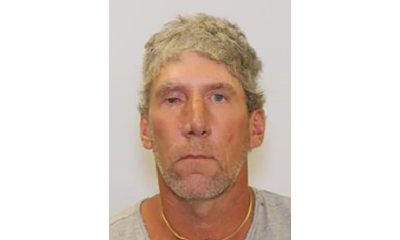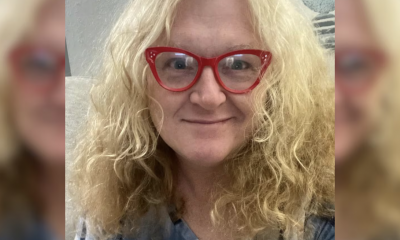National
Matthew Shepard book creates uproar
Laramie sheriff calls writer’s claims about 1998 murder ‘conspiracy theory BS’


A new book claims Matthew Shepard sold crystal meth and worked as an escort. His family said it won’t respond to ‘conspiracy theories.’
A newly published book that claims gay University of Wyoming student Matthew Shepard had a sexual relationship with his killer and his 1998 murder wasn’t a hate crime has triggered expressions of outrage by LGBT activists and fueled efforts by anti-gay groups to downplay the need for hate crimes laws.
“The Book of Matt: Hidden Truths About the Murder of Matthew Shepard,” written by gay journalist Stephen Jimenez and officially released on Tuesday, comes on the eve of the 15th anniversary of Shepard’s murder in Laramie, Wyo.
It also comes at a time when the “Laramie Project,” the internationally acclaimed play about the Shepard murder and its portrayal of the slaying as a hate crime, is about to open at the Ford’s Theater in Washington with a newly produced epilogue.
In addition, a documentary film called “Matt Shepard is a Friend of Mine,” directed by a filmmaker who was one of Shepard’s high school friends, is scheduled to premiere at the Washington National Cathedral on Oct. 4.
With the play and film exploring the Shepard murder as a hate crime that adversely impacted an entire community beyond the scope of an individual victim, the startling assertions made in Jimenez’s book have prompted at least one prominent gay commentator to reassess longstanding assumptions about the Shepard case.
“Events are more complicated than most politicians and activists want them to be,” said gay conservative commentator Andrew Sullivan. “No one should be afraid of the truth.”
Among the book’s claims is that Shepard, 21, knew and socialized with Aaron McKinney, also 21, one of two men convicted of his murder, at least a year before the crime. According to Jimenez’s stated findings in the book, Shepard and McKinney each used and sold crystal meth, both had been involved with an escort service in Denver and Laramie that arranged for them to have sex for money with men, they were seen at the same parties in Laramie, and the two occasionally had sex with each other.
Jimenez told the Blade he devoted more than 13 years of research and investigative reporting in preparation for his book, interviewing more than 100 people on the record, including a dozen people he identifies as friends of Shepard and more than a dozen friends of McKinney.
But some of the national LGBT advocacy groups have joined the Matthew Shepard Foundation, which was created by Shepard’s parents to combat anti-LGBT violence, in challenging the accuracy of the book and the credibility of its sources.
“Attempts now to rewrite the story of this hate crime appear to be based on untrustworthy sources, factual errors, rumors and innuendo rather than the actual evidence gathered by law enforcement and presented in a court of law,” a statement released by the Shepard Foundation says.
“We do not respond to innuendo, rumor or conspiracy theories,” the statement says. “Instead we remain committed to honoring Matthew’s memory, and refuse to be intimidated by those who seek to tarnish it.”
Albany County, Wyo., Sheriff David O’Malley, who served as Laramie police commander at the time of the murder, told the Blade on Tuesday that he believes the book “is full of lies” and described it as “conspiracy theory BS.”
Jimenez said he and others working with him have thoroughly and meticulously scrutinized and vetted the findings of his investigation, which he says included a careful reading of virtually all of the police and court records related to the case that initially had been sealed by a judge.
Laramie officials have said the records became available to the public in late 1999 shortly after the conclusion of the trial of McKinney, who was convicted of bludgeoning Shepard to death by repeatedly striking him in the head with the barrel of a .357 Magnum pistol while Shepard was tied to a fence at an isolated prairie just outside of town.
Co-defendant Russell Henderson confessed to having tied Shepard to the fence while accompanying McKinney on what he said began as a plan by McKinney to lure Shepard from a Laramie bar to rob him. Unlike McKinney, Henderson pleaded guilty to a murder charge rather than face a trial. Both men were sentenced to life in prison without the possibility of parole.
“I think the discovery of who Matthew Shepard was as a person and the complexity of who he was as a human being is really important,” Jimenez told the Blade.
“And so my reason for writing the book is to really say let’s understand what was really going on here,” he said. “If we’re serious about dealing with hate and violence in the culture, let’s understand what really happened here. What are the forces that came into play that created this grotesquely violent murder?”
Added Jimenez: “And certainly as I know now, the official story that these were two strangers that walked into a bar and targeted Matthew because he looked well-dressed and looked like he had money and appeared to be gay or that Matthew came on to them in the bar or that they lured him out of the bar because he was gay – those are simply not true.”
Jimenez was referring to the findings in the official police report that was based in part on a confession by McKinney to police at the time of his arrest three days after the murder. In his confession, McKinney said he and Henderson planned to rob Shepard, not to kill him. He said he lost control of his emotions and actions after Shepard allegedly groped him in the pickup truck that Henderson was driving after Shepard accepted McKinney’s invitation to drive him home from the Fireside bar on the night of Oct. 6, 1998.
McKinney’s lawyers, who attempted to invoke the so-called “gay panic” defense at McKinney’s trial, told the jury in his November 1999 closing argument that McKinney’s judgment was clouded that night by his consumption of alcohol and his use of and addiction to crystal meth amphetamine.
“Aaron McKinney is not a cold-blooded killer,” defense attorney Dion Custis said. “What happened is he hit him too many times” after the crystal meth consumption and Shepard’s alleged groping caused him to fly into an “uncontrollable rage.”
LGBT advocacy groups, noting that perpetrators of anti-gay hate crimes often use the gay panic defense as an alibi, said at the time that McKinney’s use of the gay panic defense confirmed their belief that McKinney’s motive was anti-gay hatred.
O’Malley said the police investigation found that McKinney had not been using crystal meth for several days and that investigators concluded that the murder “had nothing to do with drugs.” He said that the incident started as a robbery but investigators believe the brutality of the beating, in which McKinney crushed Shepard’s skull, involved a form of “overkill” that indicated the true motive was anti-gay animus.
Jimenez argues in his book that McKinney was suffering from the effects of his crystal meth use at the time of the attack but that some of his animus toward Shepard was based on alleged conflicts over a drug deal at a time when the two were working for rival drug suppliers. He bases this theory on information from both named and anonymous sources.
“It boggles the mind that this book flies in the face of all of the evidence related to the drug use,” said Cathy Renna, a former official with Gay & Lesbian Alliance Against Defamation (GLAAD), who attended the McKinney trial.
“Aaron McKinney has changed his story so many times it’s not even worth trying to keep count,” said Renna in referring to subsequent statements that McKinney has made to reporters in interviews from jail.
“But the one thing that Aaron McKinney has been clear about and has remained consistent to is that he didn’t know Matt beforehand.”
Renna and others questioning the reliability of Jimenez’s sources have cited a memo that ABC News correspondent Elizabeth Vargas mistakenly left at O’Malley’s residence in 2004, when she interviewed O’Malley, as confirmation that Jimenez reached his conclusions about the Shepard case before he began research for a controversial report on the ABC program 20/20. The memo, according to critics who have seen it, outlined the view the Shepard murder was not a hate crime along with some of the other revelations recounted in the Jimenez book.
Jimenez, however, told the Blade that the criticism is unfounded because his memo was based on more than two years of research that he already had conducted on the case long before he became involved in the 20/20 project.
He also disputes claims by critics that the 20/20 broadcast on the Shepard case in 2004 was based on unreliable sources.
“When I did the ABC News story every single note, every single interview transcript, everything we did was vetted by the top vice presidents and lawyers at ABC,” Jimenez said.
Concerning his book, Jimenez notes that the lead prosecutor in the Shepard murder case, Cal Rerucha, has stated on the record in his book that he agrees that the preponderance of evidence shows that drugs rather than anti-gay hate was the motive behind the murder of Matthew Shepard.
Regardless of whether the claims in Jimenez’s book are correct or not, some LGBT activists question the purpose of such a book, which they note has already been cited by right-wing anti-gay organizations to question the validity of hate crime legislation.
State Department
State Department releases annual human rights report
Antony Blinken reiterates criticism of Uganda’s Anti-Homosexuality Act

Secretary of State Antony Blinken on Monday once again reiterated his criticism of Uganda’s Anti-Homosexuality Act upon release of the State Department’s annual human rights report.
“This year’s report also captures human rights abuses against members of vulnerable communities,” he told reporters. “In Afghanistan, the Taliban have limited work opportunities for women, shuttered institutions found educating girls, and increasing floggings for women and men accused of, quote, ‘immoral behavior,’ end quote. Uganda passed a draconian and discriminatory Anti-Homosexuality Act, threatening LGBTQI+ individuals with life imprisonment, even death, simply for being with the person they loved.”
Ugandan President Yoweri Museveni last May signed the law, which contains a death penalty provision for “aggravated homosexuality.”
The U.S. subsequently imposed visa restrictions on Ugandan officials and removed the country from a program that allows sub-Saharan African countries to trade duty-free with the U.S. The World Bank Group also announced the suspension of new loans to Uganda.
Uganda’s Constitutional Court earlier this month refused to “nullify the Anti-Homosexuality Act in its totality.” More than a dozen Ugandan LGBTQ activists have appealed the ruling.
Clare Byarugaba of Chapter Four Uganda, a Ugandan LGBTQ rights group, on Monday met with National Security Council Chief-of-Staff Curtis Ried. Jay Gilliam, the senior LGBTQI+ coordinator for the U.S. Agency for International Development, in February traveled to Uganda and met with LGBTQ activists who discussed the Anti-Homosexuality Act’s impact.
“LGBTQI+ activists reported police arrested numerous individuals on the basis of their sexual orientation or gender identity and subjected many to forced anal exams, a medically discredited practice with no evidentiary value that was considered a form of cruel, inhuman, and degrading treatment and could amount to torture,” reads the human rights report.
The report, among other things, also notes Ugandan human rights activists “reported numerous instances of state and non-state actor violence and harassment against LGBTQI+ persons and noted authorities did not adequately investigate the cases.”
Report highlights anti-LGBTQ crackdowns in Ghana, Hungary, Russia
Ghanaian lawmakers on Feb. 28 approved the Promotion of Proper Human Sexual Rights and Ghanaian Family Values Bill. The country’s president, Nana Akufo-Addo, has said he will not sign the measure until the Ghanaian Supreme Court rules on whether it is constitutional or not.
The human rights report notes “laws criminalizing consensual same-sex sexual conduct between adults” and “crimes involving violence or threats of violence targeting lesbian, gay, bisexual, transgender, queer or intersex persons” are among the “significant human rights issues” in Ghana.
The report documents Hungarian Prime Minister Viktor Orbán and members of his right-wing Fidesz party’s continued rhetoric against “gender ideology.” It also notes Russia’s ongoing crackdown against LGBTQ people that includes reports of “state actors committed violence against LGBTQI+ individuals based on their sexual orientation or gender identity, particularly in Chechnya.”
The report specifically notes Russian President Vladimir Putin on July 24 signed a law that bans “legal gender recognition, medical interventions aimed at changing the sex of a person, and gender-affirming care.” It also points out Papua New Guinea is among the countries in which consensual same-sex sexual relations remain criminalized.

The Cook Islands and Mauritius in decriminalized homosexuality in 2023.
The report notes the Namibia Supreme Court last May ruled the country must recognize same-sex marriages legally performed outside the country. The report also highlights the Indian Supreme Court’s ruling against marriage equality that it issued last October. (It later announced it would consider an appeal of the decision.)
Congress requires the State Department to release a human rights report each year.
The Biden-Harris administration in 2021 released a memorandum that committed the U.S. to promoting LGBTQ+ and intersex rights abroad.
The full report can be read here.
National
Same-sex couples vulnerable to adverse effects of climate change
Williams Institute report based on Census, federal agencies

A new report by the Williams Institute at the UCLA School of Law finds that same-sex couples are at greater risk of experiencing the adverse effects of climate change compared to different-sex couples.
LGBTQ people in same-sex couple households disproportionately live in coastal areas and cities and areas with poorer infrastructure and less access to resources, making them more vulnerable to climate hazards.
Using U.S. Census data and climate risk assessment data from NASA and the Federal Emergency Management Agency, researchers conducted a geographic analysis to assess the climate risk impacting same-sex couples. NASA’s risk assessment focuses on changes to meteorological patterns, infrastructure and built environment, and the presence of at-risk populations. FEMA’s assessment focuses on changes in the occurrence of severe weather events, accounting for at-risk populations, the availability of services, and access to resources.
Results show counties with a higher proportion of same-sex couples are, on average, at increased risk from environmental, infrastructure, and social vulnerabilities due to climate change.
“Given the disparate impact of climate change on LGBTQ populations, climate change policies, including disaster preparedness, response, and recovery plans, must address the specific needs and vulnerabilities facing LGBTQ people,” said study co-author Ari Shaw, senior fellow and director of international programs at the Williams Institute. “Policies should focus on mitigating discriminatory housing and urban development practices, making shelters safe spaces for LGBT people, and ensuring that relief aid reaches displaced LGBTQ individuals and families.”
“Factors underlying the geographic vulnerability are crucial to understanding why same-sex couples are threatened by climate change and whether the findings in our study apply to the broader LGBTQ population,” said study co-author Lindsay Mahowald, research data analyst at the Williams Institute. “More research is needed to examine how disparities in housing, employment, and health care among LGBT people compound the geographic vulnerabilities to climate change.”
Read the report
Federal Government
Lambda Legal praises Biden-Harris administration’s finalized Title IX regulations
New rules to take effect Aug. 1

The Biden-Harris administration’s revised Title IX policy “protects LGBTQ+ students from discrimination and other abuse,” Lambda Legal said in a statement praising the U.S. Department of Education’s issuance of the final rule on Friday.
Slated to take effect on Aug. 1, the new regulations constitute an expansion of the 1972 Title IX civil rights law, which prohibits sex-based discrimination in education programs that receive federal funding.
Pursuant to the U.S. Supreme Court’s ruling in the landmark 2020 Bostock v. Clayton County case, the department’s revised policy clarifies that discrimination on the basis of sexual orientation and gender identity constitutes sex-based discrimination as defined under the law.
“These regulations make it crystal clear that everyone can access schools that are safe, welcoming and that respect their rights,” Education Secretary Miguel Cardona said during a call with reporters on Thursday.
While the new rule does not provide guidance on whether schools must allow transgender students to play on sports teams corresponding with their gender identity to comply with Title IX, the question is addressed in a separate rule proposed by the agency in April.
The administration’s new policy also reverses some Trump-era Title IX rules governing how schools must respond to reports of sexual harassment and sexual assault, which were widely seen as imbalanced in favor of the accused.
Jennifer Klein, the director of the White House Gender Policy Council, said during Thursday’s call that the department sought to strike a balance with respect to these issues, “reaffirming our longstanding commitment to fundamental fairness.”
“We applaud the Biden administration’s action to rescind the legally unsound, cruel, and dangerous sexual harassment and assault rule of the previous administration,” Lambda Legal Nonbinary and Transgender Rights Project Director Sasha Buchert said in the group’s statement on Friday.
“Today’s rule instead appropriately underscores that Title IX’s civil rights protections clearly cover LGBTQ+ students, as well as survivors and pregnant and parenting students across race and gender identity,” she said. “Schools must be places where students can learn and thrive free of harassment, discrimination, and other abuse.”
-

 South America3 days ago
South America3 days agoDaniel Zamudio murderer’s parole request denied
-

 Maryland4 days ago
Maryland4 days agoMontgomery County police chief discusses arrest of trans student charged with planned school shooting
-

 Politics5 days ago
Politics5 days agoCourt records raise concerns about right-wing TikTok investor’s influence
-

 Commentary4 days ago
Commentary4 days agoWorld ‘isn’t much different today’












